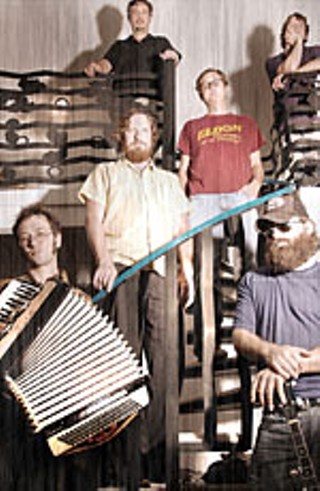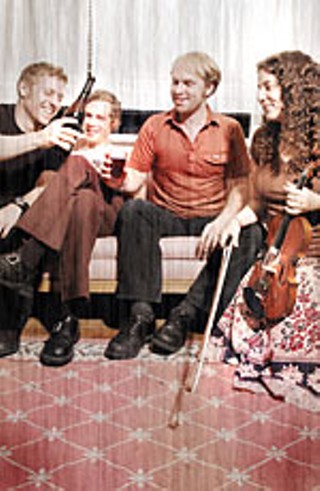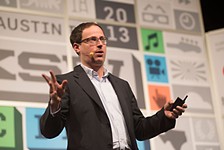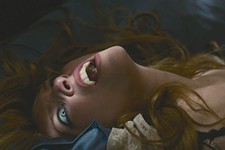Cinemascope
My Education and Cue: The Instrumental Auteur Theory
By Audra Schroeder, Fri., July 15, 2005

My Education's Neorealism
While so much rock music is based on lyrics, messages, three chords, and a broken heart, My Education have taken all those factors out of the equation to create music that is tear- and wank-free. Theirs is a sonic viscera, pulled from the soft pink underbelly of experimental music.
Yes, the Austin sextet – that's Brian Purington and Chris Hackstie on guitar; Eric Gibbons, bass; Kirk Laktas, keyboards; James Alexander, viola; and Sean Seagler on drums – plays instrumental music, a term that, in recent years, has been associated solely with a small group of bands (namely Tortoise, Mogwai, and Godspeed You! Black Emperor). My Education sounds nothing like those bands and, in fact, even they have trouble describing their cosmicrockwormholejams.
"We've been called 'ambient punk rock,'" says Laktas. "That's not necessarily what we would call it."
"Angelic retarded accidents," injects Seagler.
"Don't forget 'advanced ecstasy,'" offers Alexander.
My Education formed when friends Seagler, Gibbons, and Purington all moved to Austin from San Angelo, Texas, in the late Nineties.
"I believe it's the mohair capitol of the world," Purington cracks. "The town has been in a state of draught for something like 30 years now. In other words, human life should not exist there. Back in high school, the punk band I played in rented out the La Quinta Inn's ballroom and hosted shows for touring punk acts."
From these humble beginnings, the group came together in 1999 from local bands like Cinders, Stars of the Lid, and Ultrasound, and a two-track 7-inch resulted. In 2002, My Education released 5 Popes, a five-song EP of beautifully orchestrated land-mine pop – chaos and free-skrazz colliding in the desert on the hottest day of summer. The group toured on and off for the next few months, playing to 10 people in Minneapolis and 600 in Winnipeg and, according to their Web site, were offered speed by an Iranian in Houston and one member almost threw another out of a speeding van on I-95. There was also a lot of puking and urinating. Like their academia-themed moniker suggests, the band takes a very abstract approach to the music.
"There's no director, it all builds off an idea," says Hackstie, a Florida transplant. "An idea may come in one way, but the end result will be completely different. Each individual personality is represented."
Literally. In fact, the band explains their relationship in terms of a TV sitcom family: Purington is the smart teenage sister, Gibbons and Seagler are the obnoxious twin brothers, Hackstie's the dad, Laktas is mom, and Alexander is the lovable uncle who also happens to be a classically trained viola player. After hanging out with these guys for a few hours you begin to realize it's true. And much like a TV sitcom (sans the canned laughter), these guys aren't as serious as their music seems. You may think for music as ethereal as theirs, that they sit around writing in velvet-bound journals and meditating Eno-style. Not so.
"I think my favorite way to do it is when someone comes in and says something like 'pork chop' and then we all think about it for a few minutes, and then we just start playing," explains Seagler. "Sometimes, if one of us has an idea that we can't express, I'll be like, 'Ya know, it's a-bum-bum shee ...'"
"Then I'll be like, 'Doo-doo-boom,'" finishes Gibbons. "And everyone's like, 'Oh yeah, I know what you're talking about.'"
The band started recording their most recent disc, Italian, in 2003 at the Bubble in Austin. Whereas 5 Popes only took about a week, Italian remained a work in progress for the entirety of its creative process. This time around, money and time became an issue, but the end result was a labor of love.
"From one song to another could be a time lapse of a year," says Hackstie.
"Chris left the band to become an aerobics instructor," adds Seagler. "That took a year."
"It was pretty frustrating," Hackstie continues. "We were ready to be done with it."
Italian is 12 songs of combustible, pilot-light-igniting melodic squall, an impressively ambitious sophomore LP for a band so rooted in the Texas rock scene (austinchronicle.com/issues/dispatch/2005-04-29/music_phases4.html). It transcends a simple post/psych/punk rock moniker.
"Whether anyone wants to admit, I think we all think of [the music] cinematically," asserts Hackstie. "I think we would do best to come from a cinematic point of view. I think we work well with something like that."
Fittingly, the band took songs they already had and used them as a live soundtrack to Mamoru Oshii's 1982 film, Angel's Egg, which screened at the Alamo Drafthouse last spring. This year's SXSW proved especially fruitful for the band in terms of exposure. In addition to a sound guy excitedly telling them they hit 120 decibels during their set, their performance at the Velvet Spade gained them one new fan: Johnny Ramone haircut icon and Rolling Stone senior music critic David Fricke.
"It was definitely a proud personal moment," Seagler acknowledges as the others nod in unison. "When I think of him, I think of his interviews with Wilco, Brian Wilson. For him to throw a little attention on us ..."
"We were like 'Holy fucking shit,'" Gibbons finishes.
"He insisted on buying both CDs," Hackstie says.
Hilariously, Fricke's praise of Italian may have inadvertently helped My Education reach a greater audience, one with their feet in the pews and their hands on Jesus' coattails. "We're doing pretty good on the Christian scene," Laktas reveals, speaking of the Christian Web site that reviewed 5 Popes. "They loved it."
"Well, especially since we don't say anything," Purington says.
"They haven't played it backwards yet," Gibbons deadpans.
When asked if there are any religious undertones to their album titles, the reply is a resounding "no."
The band is currently working on an EP and has two new songs. Naturally, My Education is a learning experience, and this wacky little family of melody-philes is making sure their music speaks for itself.
"I was at a loss for a band name, and looking at my bookshelf I came across William S. Burroughs' My Education," Purington says. "I thought that summed up what it's like growing up playing in a band – a process that's still ongoing."
Feature
Heaven On Their Minds: Cue
As a rule during an interview with a rock band, if talk turns to their love of musicals, it's time to ask for the check. If that musical happens to be Jesus Christ Superstar, you may be praying for lightning to strike. But when that band is Cue and their appreciation for it is oh so sincere, it's kind of awesome. The instrumental Austin quartet has no shame when talking about their influences, misconceptions about their sound, or their love of religious rock opera.
Cue began as a twopiece, with just high school friends Jason Brister and Clarke Dominick. "Jason and I started playing together almost exactly 10 years ago," says Dominick, lounging in the garden at Spider House. "In '97, we started playing as a duo; one of our first shows was at [former Austin punk bar] Bates Motel. Then came Colin, who was living in San Marcos at the time. We had just moved to this one house and Colin was like, 'I just want to come live with you guys in Austin for a while.' We had this ping-pong table set up in the garage, and he slept under it."
"It was awesome," says guitarist Colin Swietek, who also spent time in local electro-pop group the Octopus Project. "They were practicing as a duo, playing acoustic guitars, and I'd have all these ideas for what I could do on guitar."
As a trio, Cue released its first LP in 2001 before adding Stacy Meshbane, violinist since the age of 4 and previously of Austin's psych-lullabye band TunaHelpers.
"I was really scared because I've done classical my whole life, and they were all loud boys," Meshbane laughs.
The current incarnation of Cue was born. At first listen, their lyric-free approach to songwriting seems scene-driven, expressionist, orchestral. Brister insists that's just the way it happened.
"Clarke and I were weaned on a lot of the same music, and a lot of it was lyrical," Brister says. "Fugazi, and ... well, I have this renewed obsession with Jesus Christ Superstar. It's all very lyrical, but I just don't know if we have anything to say."
"The way the songs are written, they don't need any vocals," concurs Swietek. "When we're writing something, whatever sounds good to everyone is what we'll run with."
"When someone says 'cinematic,' I think of something grand," hedges Brister about the most common label attached to Cue. "I don't think we have those grand concepts in our songwriting. [The songs] might be more based around the ideas of relationships, us getting together, getting excited about something, than grander ideas like war."
"We started using 'chamber rock,' but I don't really feel like that's so accurate," Dominick says. "There are so few instrumental bands, so there are all these default labels. You want to think that you're doing something original, but for this kind of music to be a genre right now, that's fairly new."
April's Bring Back My Love (austinchronicle.com/issues/dispatch/2005-04-22/music_phases2.html) was recorded at Sweatbox studios over the period of approximately two years. The combination of Dominick's piano and glockenspiel, and Meshbane's violin create a static mix and flesh out stories where Swietek's guitar and Brister's drums are free to crawl or run to the surprise ending.
"We recorded it like four times," Brister says. "It finally worked. We were also very, very done with it."
Discussion again devolves into talk of Jesus Christ Superstar, it's viable, catchy numbers and brilliant subtext. The band quotes lines from it and sings choruses.
"Whatever people say about Andrew Lloyd Webber or the musical, it was just so awesome to me," says Dominick. "It was big and thematic, but still kind of rock & roll. I loved the rock music context."
"I'm obsessed with it right now, again," Brister says. "I can't get it out of the CD player."
"It's just ... the best story!" Dominick exclaims.
Just as he says this, a young man wearing sunglasses, flip-flops, a button-down shirt and only a towel around his waist stumbles up to the table. Even though it's after 10pm, he insists he just woke up from a "nap in the park" and asks for a cigarette. Battling hiccups, the man tells us he's an artist and stares off into the distance before snapping back to reality and alerting us that he's "going to play some basketball." He stumbles away and the band stares at each other before bursting into laughter.
"Keep Austin weird!" smiles Swietek. ![]()







